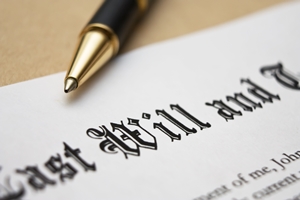 Most of the people that contact our office havequestions about whether a probate is necessary, how much it costs, and what they can do about it.
Most of the people that contact our office havequestions about whether a probate is necessary, how much it costs, and what they can do about it.
Much of the initial conversation involves a discussion aboutwhether or not the deceased person had a Will or a Trust – or both.
Because we have received many questions that are very similar, we thought that writing anarticle about the ways in which Wills and Trusts effect estates, specifically: probate estates.
Minnesota Probates and Wills
A Will is a legal document in which a person can specifically designate how certain assets will be distributedat the time of their death. These assets can include just about anything. Common examples of assets are: ahouse, car, bank accounts, retirement accounts, farmland, etc.A person does not have to include all of these assets. Furthermore, a person do not have to use a Will. A good probate attorney will explain to you that there are many other legal vehicles by which a person can give money to others outside of the Will. Many people do not understand this.
Common examples of assets which do not need to be distributein a will include: joint bank accounts and benefit fishery designations on retirement accounts. Beneficiary designations include pay on death (POD) accounts.
Minnesota Probates and Trusts
Many individuals contact our office to discuss the use of trusts in their state planning. We have found that many do not understand why a trust may be beneficial but they have heard it is a good idea to have one. It is important to understand what a Trust versus a Will.
If properly set up, a Trust is funded either at death or during life. The Trust, once it is funded with assets, becomes a separate legal vehicle which is separate from the person who makes the Trust. Thus, the trust can have its own tax identification number, bank account, and hold land if necessary.
Trusts arenot always a good idea. They can be very cumbersome and difficult for non-lawyers to understand.
However, one common example of why people feel they need a trust is to avoid probate. This may or may not be true and speaking with a qualified Minnesota probate lawyer is paramount.
At times the person may simply only need a Will, possibly a Transfer on Death Deed, or other legal document to avoid probate and effectuate the easy transfer of assets and debts upon death.
Trusts and Probate Creditors
Using a Trust can, however,create problems with creditors, funeral expenses, and other debts of a person when they die. Just because a person has a Trust does not mean that they do not have to pay their bills at the time of their death.
Many people who come to our office have questions about how to pay billswhen assets are either in a Trust or should have been a Trust or they thought were in a Trust. This is when talking with a qualified Minnesota probate lawyer is also a good idea.
Minnesota Probate Lawyers and Attorneys
To discuss the other issues about Minnesota probates and how they are affected by men wills and trusts, contact the attorneys and lawyers at Flanders law firm LLC 612-424-0398 for your free initial consultation.




You can pay off the loan on the arrival of one’s next
pay as these personal loans are provided to get 15 in order to 30 days,